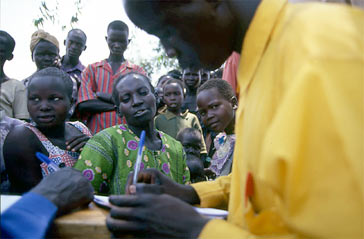UNHCR team lays groundwork for return to southern Sudan
UNHCR team lays groundwork for return to southern Sudan

JUBA, Sudan, Jan 5 (UNHCR) - Aid workers from the UN refugee agency are in Sudan to prepare for what UNHCR believes will be one of its largest refugee repatriation operations this year - pending the signing of a peace agreement between the government and southern rebel groups.
Long-time Sudan watchers believe that the parties could reach an agreement shortly, after negotiations now underway in Kenya were prolonged through the end of 2003.
In anticipation that an accord ending two decades of war will finally be signed in 2004, UNHCR last month sent an eight-person team of aid workers to Sudan. Following meetings in Khartoum, the team travelled to Juba and other areas of southern Sudan and met with provincial officials and partner agency representatives to review the needs for a possible repatriation operation.
It is estimated that the 20-year civil war in Sudan has uprooted some 4 million people inside the country, while a further 570,000 are living in neighbouring states as refugees. The largest number are in Uganda (223,000), followed by Chad (95,000), Ethiopia (88,000) and Kenya (69,000).
The UN refugee agency believes that if a peace agreement is signed in the early part of 2004, thousands of refugees may opt to return home this year.
While visiting both Khartoum and southern Sudan last November, High Commissioner for Refugees Ruud Lubbers told both Sudanese President Omar Al Bashir and the Sudan People's Liberation Movement (SPLM) leader Dr. John Garang that UNHCR wanted to support the return of refugees.
Ahead of a possible repatriation operation, UNHCR is already looking into the need for agreements among concerned parties to ensure the safe and dignified return of refugees and include the necessary amnesties and commitments from both the government and the SPLM.
During his visit, Lubbers warned that the return of refugees must be sustainable, and that considerable help would be needed by a host of partners to establish rehabilitation and reconstruction activities throughout the impoverished country. Sudan is roughly five times the size of France.
In the event an agreement is signed, UNHCR plans to operate from several locations in southern Sudan. While in Juba, its team visited premises vacated in 1990, currently used by Sudan's Commissioner for Refugees, and a warehouse compound leased to the International Committee of the Red Cross.
The refugee agency has already airlifted two vehicles from Khartoum into Juba, and is shipping four cars from Jordan and four trucks from Kosovo that are expected to reach Port Sudan shortly. Also flown into Juba was a UNHCR office kit containing computers and associated items, and other necessary equipment. Juba is held by government forces, but is largely surrounded by opposition fighters.
Returning refugees will need assistance, and the agency's team is looking at what the packages might contain, including food aid, water containers, shelter material, cooking utensils and farming tools. The aid workers were told that the packages will have to be carefully formulated to ensure that they are not out of proportion with assistance going to internally displaced persons and aid available to people living in areas of return.
Two decades of war and the region's economic collapse have left many parts of Sudan severely impoverished. Roads are in extremely poor condition throughout the south, a vast region with only the slow-moving Nile River forming a common artery.
Most national and international non-governmental organisations currently working in the region told UNHCR that they place considerable importance on peace-building and reconciliation projects to help bridge the gaps between groups. Inter-tribal differences are a source of significant tension, the UNHCR team was told.
Peace is also a vital ingredient. While much of the south appears poised to benefit from the agreement under discussion in Kenya, fighting in the west of the country has sent some 95,000 refugees fleeing into Chad since April 2003, creating a new refugee crisis.








